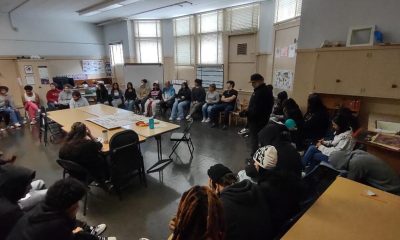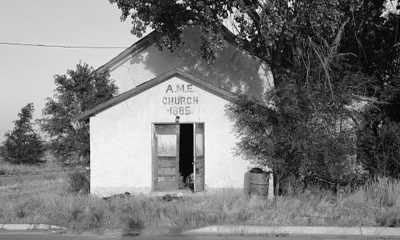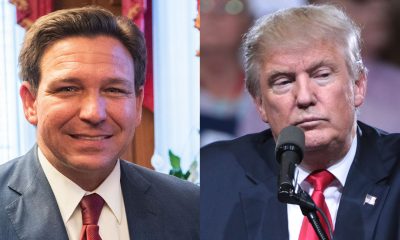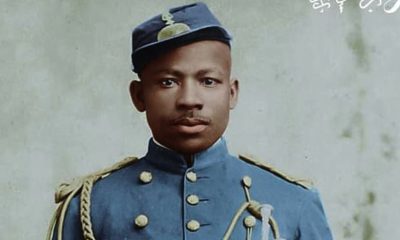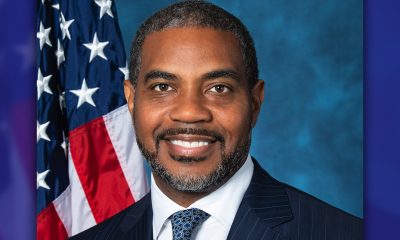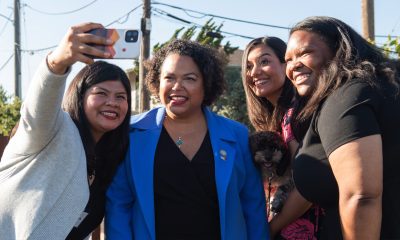World
Tourists Flocking to Cuba ‘Before the Americans Come’

In this Feb. 25, 2015 photo, tourists look for souvenirs at a shop in Trinidad, southern Cuba. The sense that detente will unleash an invasion of Yankee tourists and change the unique character of one of the world’s last remaining bastions of communism is shared by many travelers flocking here. (AP Photo/Enric Martí)
Andrea Rodriguez and Peter Orsi, ASSOCIATED PRESS
HAVANA (AP) — Bookings to Cuba jumped 57 percent for one New York tour operator in the weeks after Washington said it would renew ties with Havana. In February, they were up 187 percent; and so far this month, nearly 250 percent.
The boom is just one sign that the rush is on to see Cuba now — before, as many predict, McDonald’s claims a spot in Old Havana and Starbucks moves in on Cubita, the island’s premium coffee brand.
The sense that detente will unleash an invasion of Yankee tourists and change the unique character of one of the world’s last remaining bastions of communism is shared by many travelers flocking here.
“Cuba has a very authentic atmosphere which you see nowhere else in the world,” Gay Ben Aharon of Israel said while walking through Revolution Square. “I wanted to see it before the American world … but also the modern Western world comes here.”
Outsiders may romanticize the “time-capsule” nation, but many on the island are ready for change.
Where foreigners see charming, historic architecture, bright 1950s-era American cars and vast stretches of white-sand beaches, locals see decaying buildings in need of repair, new vehicles priced beyond their reach and a lack of economic opportunity.
For many Cubans living in dilapidated, multigenerational tenements, change could be good. It may expand access to the Internet and the outside world, creating engagement that could bring brighter economic days and, practically speaking, make it easier to fix a leaky roof.
“We’re very excited,” said Yadiel Carmenate, a 26-year-old English major at the University of Matanzas who moonlights as a tour guide.
It’s unlikely Cuba will see major changes overnight. Talks to take the first steps toward normalized relations are just beginning and there is stiff opposition in the U.S. Congress to lifting the 53-year-old embargo that bars most trade with and travel to the island.
Still, the December announcement appears to have sparked an influx of tourism.
InsightCuba, the tour operator based in New Rochelle, New York, is adding excursions as its monthly bookings explode compared with early 2014.
“It’s a huge surge,” company president Tom Popper said. “Word’s gotten out and people are communicating that they want to go before Cuba changes.”
Already this year, more foreigners are roaming the cobblestoned streets of Old Havana. Cuba saw a 16 percent increase in visitors in January compared with a year earlier, a total of about 371,000.
Tourism, a $2.6 billion-plus industry, is one of the main engines that has kept Cuba’s economy sputtering along. Last year, the country welcomed 3 million visitors, a record.
About 600,000 U.S. travelers are estimated to visit Cuba each year, most of them Cuban-Americans visiting family but also tens of thousands coming on approved cultural, religious and educational exchanges. An untold number of others have, for years, skirted travel restrictions by journeying through third countries such as the Bahamas or Mexico.
Cuban officials estimate that 1.5 million Americans would travel here annually if all restrictions were removed, supplanting Canada as the No. 1 source of tourism and potentially adding some $2 billion a year to state coffers.
However, the island is hardly ready for a Yankee invasion. Already it strains to accommodate travelers during the December-April high season.
Tourists trying to dine at high-end private restaurants are often struggling to find an empty table these days, and it’s practically impossible to get a room at Havana’s best hotels. Some travel agents report being turned away when trying to book group reservations.
Rogelio Gauvin, a tourist from Canada, predicts demand will continue to outpace capacity.
“I see a lot of construction, very nice restorations — that’s very good,” he said. “But there won’t be enough hotels. There won’t be enough restaurants. There won’t be enough services to accommodate the Americans who will come like rats on a ship.”
Privately run B&Bs and diners that have mushroomed under President Raul Castro’s economic reforms could help ease the load on the government’s 64,000 hotel rooms and bland, poorly stocked restaurants.
The recently renovated Havana airport is set to undergo a $207 million expansion led by Brazilian conglomerate Odebrecht.
Several U.S. airlines have talked of launching service to the island; currently all U.S.-Cuba flights are operated by charter companies. Canada-based Cuba Cruise has begun marketing its sea voyages directly to Americans.
Travel agents that have been doing business here for years are aware that the competition is about to get a lot stiffer. Carlos Javier Rodriguez, head of Argentina-based tour operator Carimar Eventos, expressed hope that Cuba would reserve some quota of capacity for non-U.S. travelers.
“We tour operators,” he said, “can say that we view the arrival of American tourism with trepidation.”
For now, Rodriguez is busy tending to travelers interested “in experiencing this Cuba, and right away.”
Carmenate, the university student and tour guide, dismisses concerns that the island will lose its character.
Cubans, he said, eagerly await change but won’t allow their country to become the capitalist playground it was before the 1959 revolution.
“It’s not going to be that way. Our identity, we will preserve it at all cost,” he said. “That’s why I think that it’s going to be really hard for you to find a McDonald’s or a Starbucks right down the corner.”
Thomas Mieszkowski, a 28-year-old tourist from Leeds, England, however, was among the visitors taking in the experience of seeing Cuba now — before, he said, it risks becoming “another outpost of Florida.”
___
Associated Press producer Milexsy Duran contributed to this report.
___
Andrea Rodriguez on Twitter: www.twitter.com/ARodriguezAP
Peter Orsi on Twitter: www.twitter.com/Peter_Orsi
Copyright 2015 The Associated Press. All rights reserved. This material may not be published, broadcast, rewritten or redistributed.
###
Activism
Newsom, Pelosi Welcome Election of First American Pope; Call for Unity and Compassion
“In his first address, he reminded us that God loves each and every person,” said Newsom. “We trust that he will shepherd us through the best of the Church’s teachings: to respect human dignity, care for the poor, and wish for the common good of us all.” Newsom also expressed hope that the pontiff’s leadership would serve as a unifying force in a time of global instability.

By Bo Tefu, California Black Media
Gov. Gavin Newsom and First Partner Jennifer Siebel Newsom on May 8 issued a statement congratulating Pope Leo XIV on his historic election as the first American to lead the Catholic Church.
The announcement has drawn widespread reaction from U.S. leaders, including former House Speaker Nancy Pelosi, who called the moment spiritually significant and aligned with the values of service and social justice.
In their statement, the Newsoms expressed hope that the newly elected pope would guide the Church with a focus on compassion, dignity, and care for the most vulnerable. Newsom said he and the First Partner joined others around the world in celebrating the milestone and were encouraged by the pope’s first message.
“In his first address, he reminded us that God loves each and every person,” said Newsom. “We trust that he will shepherd us through the best of the Church’s teachings: to respect human dignity, care for the poor, and wish for the common good of us all.”
Newsom also expressed hope that the pontiff’s leadership would serve as a unifying force in a time of global instability.
“May he remind us that our better angels are not far away — they’re always within us, waiting to be heard,” he said.
Pelosi, a devout Catholic, also welcomed the pope’s election and noted his symbolic connection to earlier church leaders who championed workers’ rights and social equality.
“It is heartening that His Holiness continued the blessing that Pope Francis gave on Easter Sunday: ‘God loves everyone. Evil will not prevail,’” said Pelosi.
Activism
Retired Bay Area Journalist Finds Success in Paris with Black History Tours
In the late 90s, Stevenson finally realized her dream of living in Paris, now with her daughter. She started exploring the history of Africans in the city and would go on to teach others the same. Her business, which she named Black Paris Tours (BPT), received a significant boost when a family friend gave her a stack of cash and encouraged her to expand on the knowledge that she had only started to share with people she knew.

By Post Staff
There were two things Oakland-born, East Palo Alto-raised Ricki Stevenson always dreamed of:
- Going to New York as a newscaster to tell the true story of Blacks in America.
- Living and working in Paris one day.
Her dreams of life in Paris began when she was three years old and her mother, a former professional dancer, took her to see Josephine Baker perform. She was 11 when her parents took her to the Stanford University campus to meet James Baldwin, who was speaking about his book, “The Fire Next Time.” Ricki says that’s when she knew she’d one day live in Paris, “the city of light!”
But before that would ever happen, she had a tumultuous career as a newscaster across the country that was inspired by her family’s history.
Stevenson recalls marching with Cesar Chavez as he fought for labor rights for farm workers in California.
“Are we Mexican too?” she asked her parents. “No, but we will fight for everyone’s human rights,” they responded to her.
Ironically, Ricki’s paternal family roots went back to Greenwood, Oklahoma, infamous for the 1921 bombing of Black Wall Street. A time when Black people had oil wells, banks, and a thriving business community.
This background would propel her into a 25-year journalism career that gave her the opportunity to interview greats like President Jimmy Carter, PLO leader Yassir Arafat, James Baldwin, Rev. Jesse Jackson, UN Ambassador Andrew Young, Miriam Makeba, and the leaders of South African liberation movements.
A job offer from KCBS radio brought her back to the Bay Area in the 1980s. Then came the switch to TV when she was hired as a Silicon Valley business reporter with KSTS TV, working at the first Black-owned television station in northern CA (created and owned by John Douglas). Along the way, Stevenson worked as an entertainment reporter with BET; coproduced, with her disc jockey brother Isaac, a Bay Area show called “Magic Number Video;” lived in Saudi Arabia; worked as an international travel reporter with News Travel Network; and worked at KRON TV a news anchor and talk show host.
In 1997, Stevenson realized her dream of living in Paris with her young daughter, Dedie. She started exploring the history of Africans in the city and would go on to teach others the same. Her business, which she named Black Paris Tours (BPT), received a significant boost when a family friend, Admiral Robert Toney put a chunk of money in her hand. He said, “Ricki, my wife and I have been coming to Paris for 20 years, but in just two days with you and Dedie, we’ve learned and seen more than we ever did before.”
Years after BPT took off, Ricki met Nawo Carol Crawford and Miguel Overton Guerra, who she recruited as senior scholar guides for Black Paris Tours.
Guerra says he is proud of his work with Black Paris Tours in that it provides a wealth of information about the rich legacy of African and African American history and influence in Paris and Europe.
“I tend to have a feeling for history always being a means of a reference point backwards … you start to understand the history, that it isn’t just the United States, that it began with African people,” Guerra says.
He said that it’s been a pleasure to watch people learn something they didn’t know before and to take them through the city to key points in Black history, like hangout spots for writers like Baldwin and Richard Wright, restaurants in the busiest parts of Paris, the home of Josephine Baker and so much more.
Although the tours are open to all, Guerra hopes that those of African descent from all over the world can embrace that they don’t have to just stay where they are because movies and media have portrayed cities like Paris to be only white, it’s multicultural and accepting to all.
“We’ve been here, and we’ve been there, going way back when. And we shouldn’t be considered or consider ourselves to be strangers in any place that we go to,” he said.
Stevenson notes they’ve had 150,000 people take their tour over the years, with notables like former NFL quarterback Colin Kaepernick, Smokey Robinson, Steve Harvey, Miriam Makeba, and more.
Friends and former media colleagues of Stevenson compliment the BPT crew on their knowledge of the city and their ability to always keep it interesting.
“He [Guerra] just had a deep, deep wealth of knowledge and he was constantly supplanting information with historical facts and the like. I love that it was demonstrating and showing how Black people have thrived in Paris or contributed to the culture in Paris,” Candice Francis said.
She toured in the summer of 2022 and stated that in the two weeks that they visited Paris, BPT was the highlight of her trip. She shared that she was proud of Stevenson and the life she’d managed to manifest and build for herself.
“Even if you’re visiting Paris for the tenth time, if you haven’t taken the tour, then by all means, take it,” Francis emphasized.
Magaly Muñoz, Gay Plair and Paul Cobb also contributed to this story. You can book your own adventure with Black Paris Tours at www.blackparistour.com.
Activism
COMMENTARY: Will a Dictator’s Loss Change Trump’s Tune?
What’s happened in Syria has the potential of reshaping the politics of the entire Middle East. The U.S. can’t afford to sit back and do nothing. Now is the time to exert peaceful, diplomatic influence on how Syria maintains stability and goes forward with a new democracy.
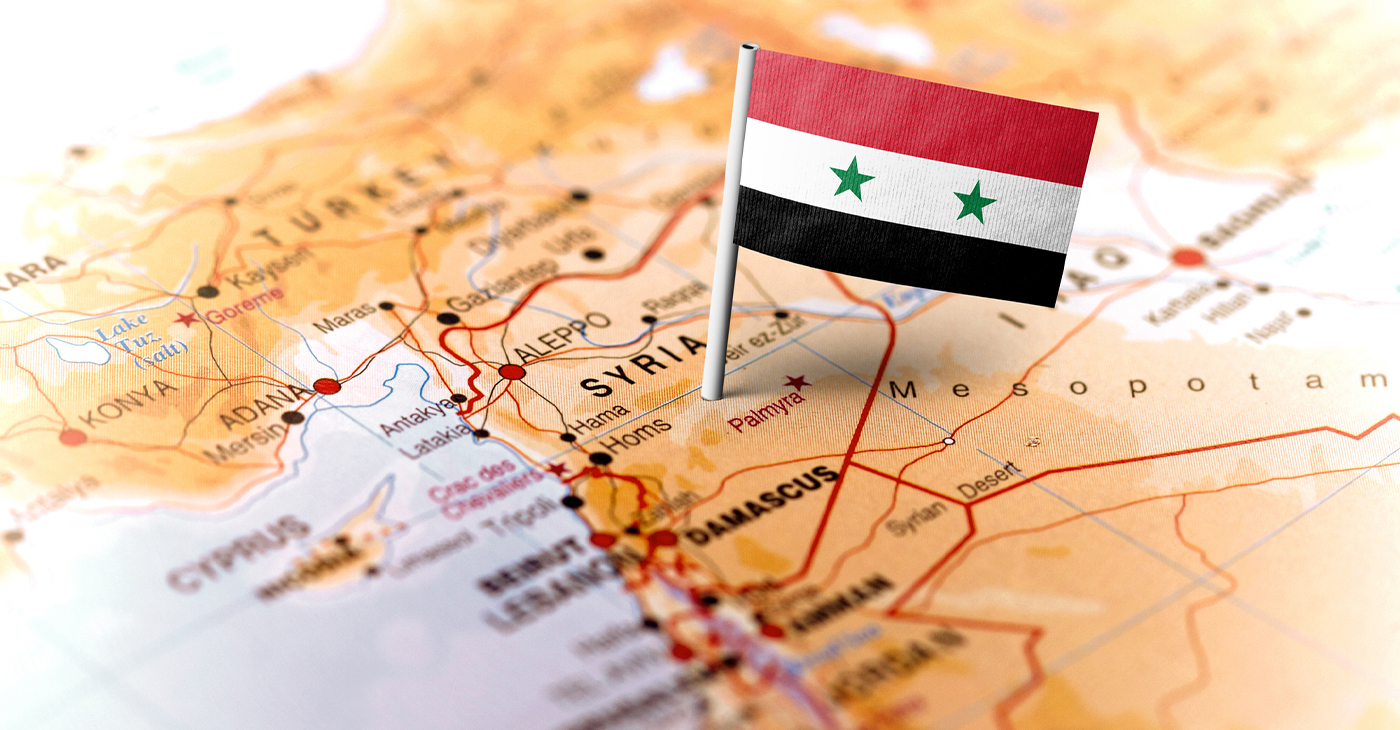
By Emil Guillermo
In our polarized country, half of America can’t wait, while many of us still wonder, “where’s Kamala?”
I hope President-elect Trump — who famously said during the campaign that he’d be a dictator on day one — eats his words.
Dictators aren’t doing so well these days.
Last weekend, the dictator Bashar al-Assad was run out of Syria and sought exile with his puppet master/dictator Vladimir Putin of Russia. In just about two weeks, a coalition of rebels applied enough pressure to end a family regime in Syria that lasted 50 years.
al-Assad’s wealthy family dictatorship plundered Syria and ruled in terror.
It sounds all too familiar to Filipino Americans, many of whom came to the U.S. fleeing the Philippine dictator Ferdinand Marcos.
al-Assad’s end was different from the Filipinos who forged a peaceful People Power movement that chased the Marcos family to Hawaii where they sought refuge from their U.S. puppet handlers.
But as in Manila, there was cheering on the streets of Syria. Men, women, and children. Christian, Muslims, different sects and ethnicities, all united against al-Assad.
al-Assad has been described as a genocidal narco-trafficking tyrant, whose friends were America’s biggest enemies, Iran, Hezbollah, and Russia, said Mouaz Moustafa, the executive director of the Syrian Emergency Task Force, on CNN.
Moustafa said it was amazing that there would be no more Russian airstrikes, no more al-Assad gulags torturing civilians. “To see good triumph over evil is an amazing thing,” he added.
But last weekend has some trickle down.
Consider that we are talking about al-Assad, the one Tulsi Gabbard consorted with and hyped to her colleagues when she was in Congress. Now Assad has been shamed into exile with his puppet master Russia, and Gabbard wants to be the U.S. director of national security? Given her wrongheaded judgment on al-Assad, can she be trusted with any national secrets?
It’s still not over in Syria, as now there will be a scramble to see what kind of governing democracy emerges.
Predictably, Donald Trump has said, “The United States should have nothing to do with it. This is not our fight. Let it play out. Do not get involved.”
Nouveau isolationism?
What’s happened in Syria has the potential of reshaping the politics of the entire Middle East. The U.S. can’t afford to sit back and do nothing. Now is the time to exert peaceful, diplomatic influence on how Syria maintains stability and goes forward with a new democracy.
Overall, the ouster of the dictator should give Trump pause.
If by nominating MAGA loyalists like Gabbard, Pete Hegseth and Kash Patel, Trump’s testing the evolution to strongman rule in the U.S., he should consider what happened before last weekend.
In South Korea, a weak president tried to declare martial law and was voted down by Parliament. That’s a faux strongman.
Let’s hope Trump learns a lesson from the week’s news.
The next president sets the tone for a politics that’s already toxic.
He needs to remember the joy in Syria this week when an autocrat was dumped in the name of freedom and democracy.
About the Author
Emil Guillermo is an award-winning Bay Area journalist. His commentaries are on YouTube.com/@emilamok1. Or join him at www.patreon.com/emilamok
-

 Activism4 weeks ago
Activism4 weeks agoAI Is Reshaping Black Healthcare: Promise, Peril, and the Push for Improved Results in California
-

 Activism4 weeks ago
Activism4 weeks agoBarbara Lee Accepts Victory With “Responsibility, Humility and Love”
-

 Activism4 weeks ago
Activism4 weeks agoESSAY: Technology and Medicine, a Primary Care Point of View
-

 Activism4 weeks ago
Activism4 weeks agoNewsom Fights Back as AmeriCorps Shutdown Threatens Vital Services in Black Communities
-

 Activism4 weeks ago
Activism4 weeks agoFaces Around the Bay: Author Karen Lewis Took the ‘Detour to Straight Street’
-

 Arts and Culture4 weeks ago
Arts and Culture4 weeks agoBOOK REVIEW: Love, Rita: An American Story of Sisterhood, Joy, Loss, and Legacy
-

 Activism4 weeks ago
Activism4 weeks agoTeachers’ Union Thanks Supt. Johnson-Trammell for Service to Schools and Community
-

 Alameda County4 weeks ago
Alameda County4 weeks agoOUSD Supt. Chief Kyla Johnson-Trammell to Step Down on July 1


